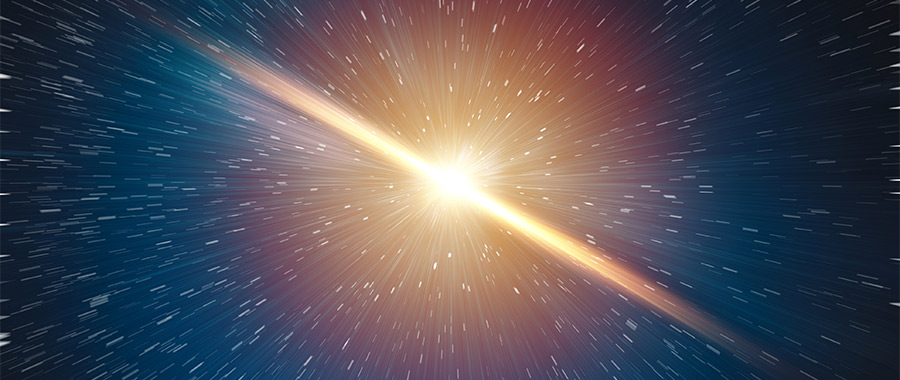The inquiry into the origins of the universe has captivated the minds of astronomers, philosophers, and theologians alike for centuries. As we delve into the relationship between Bahá’í teachings and scientific perspectives, particularly in examining the widely accepted Big Bang theory, we uncover layers of understanding that not only challenge conventional narratives but also enrich our spiritual and intellectual discourse.
At the core of Bahá’í cosmology lies the assertion that the universe is characterized by an inherent unity and interconnectedness. This perspective invites a reconsideration of the Big Bang theory, which posits a singular explosive event approximately 13.8 billion years ago as the genesis of our cosmos. What if the creation of the universe transcends mere physical data and delves into metaphysical realms?
Firstly, Bahá’í teachings illuminate the notion that existence is not merely a series of random events. Instead, every facet of the universe’s unfolding bears purpose and continuity. In this sense, the universe is not a static entity but a dynamic tapestry woven together by Divine Will. Thus, the inquiry into the origins of the universe becomes not solely a scientific matter but a spiritual exploration that invites deeper reflection.
Upon examining the Big Bang theory, one must grapple with its paradoxes. While the theory offers a compelling explanation of the universe’s expansion, it paradoxically suggests an absolute beginning—an endpoint where conventional understandings of cause and effect collapse. This notion raises profound philosophical questions: What existed before the Big Bang? What was the catalyst for such an extraordinary explosion of energy and matter?
Bahá’í teachings provide an intriguing avenue for exploration. They propose a cyclical model of time and creation, where the universe undergoes phases of contraction and expansion. This cyclical viewpoint harmonizes with certain cosmic principles observed in nature, such as the rhythmic oscillations found in many biological and ecological systems. Unlike the linear temporality implied by the Big Bang, the Bahá’í perspective offers a holistic narrative—one that positions the cosmos as an eternal and ever-evolving manifestation of existence.
As we navigate further into Bahá’í concepts of creation, the Divine Essence is pivotal. The belief in an unknowable God manifests through creation, suggesting that the universe emanates from an eternal source that is not confined by the frameworks of space and time. Such a viewpoint challenges the limitations posed by the Big Bang theory, which relies heavily on empirical data to establish the universe’s inception. The Bahá’í lens encourages us to ponder the universe as a reflection of divine attributes, where each star, galaxy, and celestial phenomenon embodies a facet of the Creator’s nature.
Moreover, the implications of these teachings extend beyond cosmology. They invite a re-evaluation of humanity’s role within this grand framework. If the universe is a divine creation—eternal and evolving—then humanity is intrinsically woven into the fabric of this cosmic narrative. Bahá’í teachings assert that individuals possess the capacity to cultivate knowledge, foster connections, and contribute to the ongoing revelation of truth. This perspective not only imprints purpose on human existence but also encourages a collaborative spirit in the quest for understanding and enlightenment.
Engaging with these profound teachings prompts curiosity about the compatibility between science and spirituality. How can insights from Bahá’í teachings coexist with scientific reasoning? The answer lies in the acknowledgment that science and religion are two complementary lenses through which we can discern the mysteries of existence. Each offers methods of exploration that, while distinct, share the common goal of uncovering truth. Scientific inquiry elucidates the mechanics of the universe, while spiritual insight reveals its deeper significance. Together, they form a comprehensive approach to answering the intricate questions surrounding creation.
As we reflect on the Big Bang theory and Bahá’í cosmology, it is essential to grasp the invitation extended to humanity. We are called to move beyond simplistic dichotomies of science versus spirituality and engage in richer, more nuanced dialogues. The Bahá’í tradition encourages an open-minded inquiry that seeks truth in all its manifestations. It encourages individuals to be active participants in the intellectual and spiritual evolution of civilization.
Moreover, exploring the universe’s beginnings through a Bahá’í lens cultivates a sense of reverence for the mysteries that abound. The cosmos, with its unfathomable intricacies, becomes an emblem of divine artistry—each star a brushstroke, each galaxy a testament to creative power. This perspective not only nurtures curiosity but also engenders a profound respect for the universe as a place of beauty and purpose.
In conclusion, the examination of the universe’s beginnings through Bahá’í teachings invites us to transcend traditional scientific boundaries and embrace a multidimensional understanding that unifies the empirical with the spiritual. As we move forth in our exploration, let us remain open to the transformative power of knowledge, fostering a spirit of inquiry—both reverential and rigorous—that leads us toward deeper truths. The dialogue between science and spirituality is an ongoing journey, one that promises to enrich our understanding of not only the universe but also our place within it.
